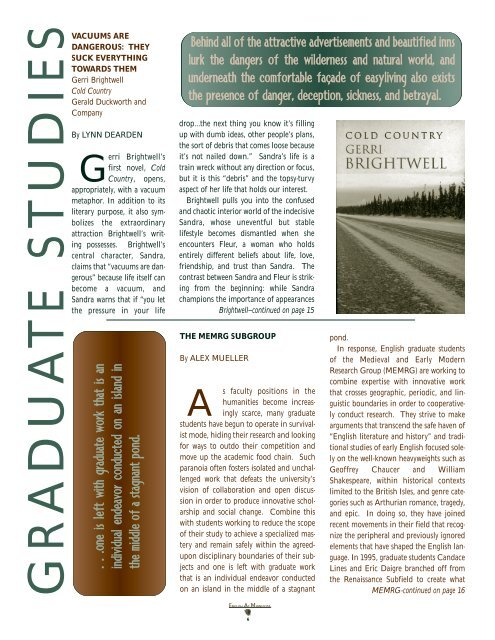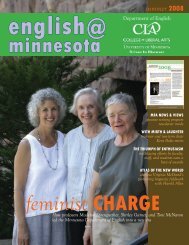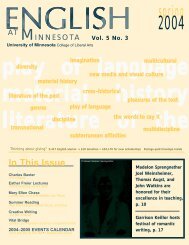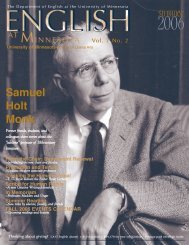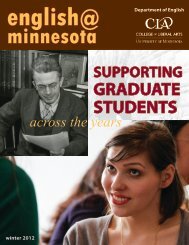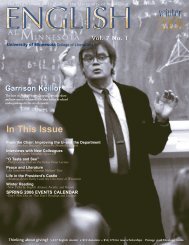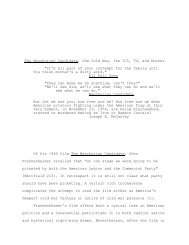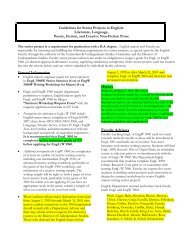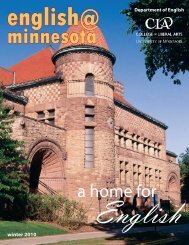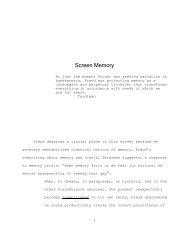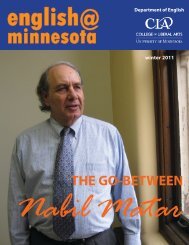fall M - Department of English - University of Minnesota
fall M - Department of English - University of Minnesota
fall M - Department of English - University of Minnesota
Create successful ePaper yourself
Turn your PDF publications into a flip-book with our unique Google optimized e-Paper software.
GRADUATE STUDIES<br />
VACUUMS ARE<br />
DANGEROUS: THEY<br />
SUCK EVERYTHING<br />
TOWARDS THEM<br />
Gerri Brightwell<br />
Cold Country<br />
Gerald Duckworth and<br />
Company<br />
By LYNN DEARDEN<br />
Gerri Brightwell’s<br />
first novel, Cold<br />
Country, opens,<br />
appropriately, with a vacuum<br />
metaphor. In addition to its<br />
literary purpose, it also symbolizes<br />
the extraordinary<br />
attraction Brightwell’s writing<br />
possesses. Brightwell’s<br />
central character, Sandra,<br />
claims that “vacuums are dangerous”<br />
because life itself can<br />
become a vacuum, and<br />
Sandra warns that if “you let<br />
the pressure in your life<br />
. . .one is left with graduate work that is an<br />
individual endeavor conducted on an island in<br />
the middle <strong>of</strong> a stagnant pond.<br />
Behind all <strong>of</strong> the attractive advertisements and beautified inns<br />
lurk the dangers <strong>of</strong> the wilderness and natural world, and<br />
underneath the comfortable façade <strong>of</strong> easyliving also exists<br />
the presence <strong>of</strong> danger, deception, sickness, and betrayal.<br />
drop…the next thing you know it’s filling<br />
up with dumb ideas, other people’s plans,<br />
the sort <strong>of</strong> debris that comes loose because<br />
it’s not nailed down.” Sandra’s life is a<br />
train wreck without any direction or focus,<br />
but it is this “debris” and the topsy-turvy<br />
aspect <strong>of</strong> her life that holds our interest.<br />
Brightwell pulls you into the confused<br />
and chaotic interior world <strong>of</strong> the indecisive<br />
Sandra, whose uneventful but stable<br />
lifestyle becomes dismantled when she<br />
encounters Fleur, a woman who holds<br />
entirely different beliefs about life, love,<br />
friendship, and trust than Sandra. The<br />
contrast between Sandra and Fleur is striking<br />
from the beginning: while Sandra<br />
champions the importance <strong>of</strong> appearances<br />
Brightwell—continued on page 15<br />
THE MEMRG SUBGROUP<br />
By ALEX MUELLER<br />
As faculty positions in the<br />
humanities become increasingly<br />
scarce, many graduate<br />
students have begun to operate in survivalist<br />
mode, hiding their research and looking<br />
for ways to outdo their competition and<br />
move up the academic food chain. Such<br />
paranoia <strong>of</strong>ten fosters isolated and unchallenged<br />
work that defeats the university’s<br />
vision <strong>of</strong> collaboration and open discussion<br />
in order to produce innovative scholarship<br />
and social change. Combine this<br />
with students working to reduce the scope<br />
<strong>of</strong> their study to achieve a specialized mastery<br />
and remain safely within the agreedupon<br />
disciplinary boundaries <strong>of</strong> their subjects<br />
and one is left with graduate work<br />
that is an individual endeavor conducted<br />
on an island in the middle <strong>of</strong> a stagnant<br />
pond.<br />
In response, <strong>English</strong> graduate students<br />
<strong>of</strong> the Medieval and Early Modern<br />
Research Group (MEMRG) are working to<br />
combine expertise with innovative work<br />
that crosses geographic, periodic, and linguistic<br />
boundaries in order to cooperatively<br />
conduct research. They strive to make<br />
arguments that transcend the safe haven <strong>of</strong><br />
“<strong>English</strong> literature and history” and traditional<br />
studies <strong>of</strong> early <strong>English</strong> focused solely<br />
on the well-known heavyweights such as<br />
Ge<strong>of</strong>frey Chaucer and William<br />
Shakespeare, within historical contexts<br />
limited to the British Isles, and genre categories<br />
such as Arthurian romance, tragedy,<br />
and epic. In doing so, they have joined<br />
recent movements in their field that recognize<br />
the peripheral and previously ignored<br />
elements that have shaped the <strong>English</strong> language.<br />
In 1995, graduate students Candace<br />
Lines and Eric Daigre branched <strong>of</strong>f from<br />
the Renaissance Subfield to create what<br />
MEMRG--continued on page 16<br />
ENGLISH AT MINNESOTA<br />
6


